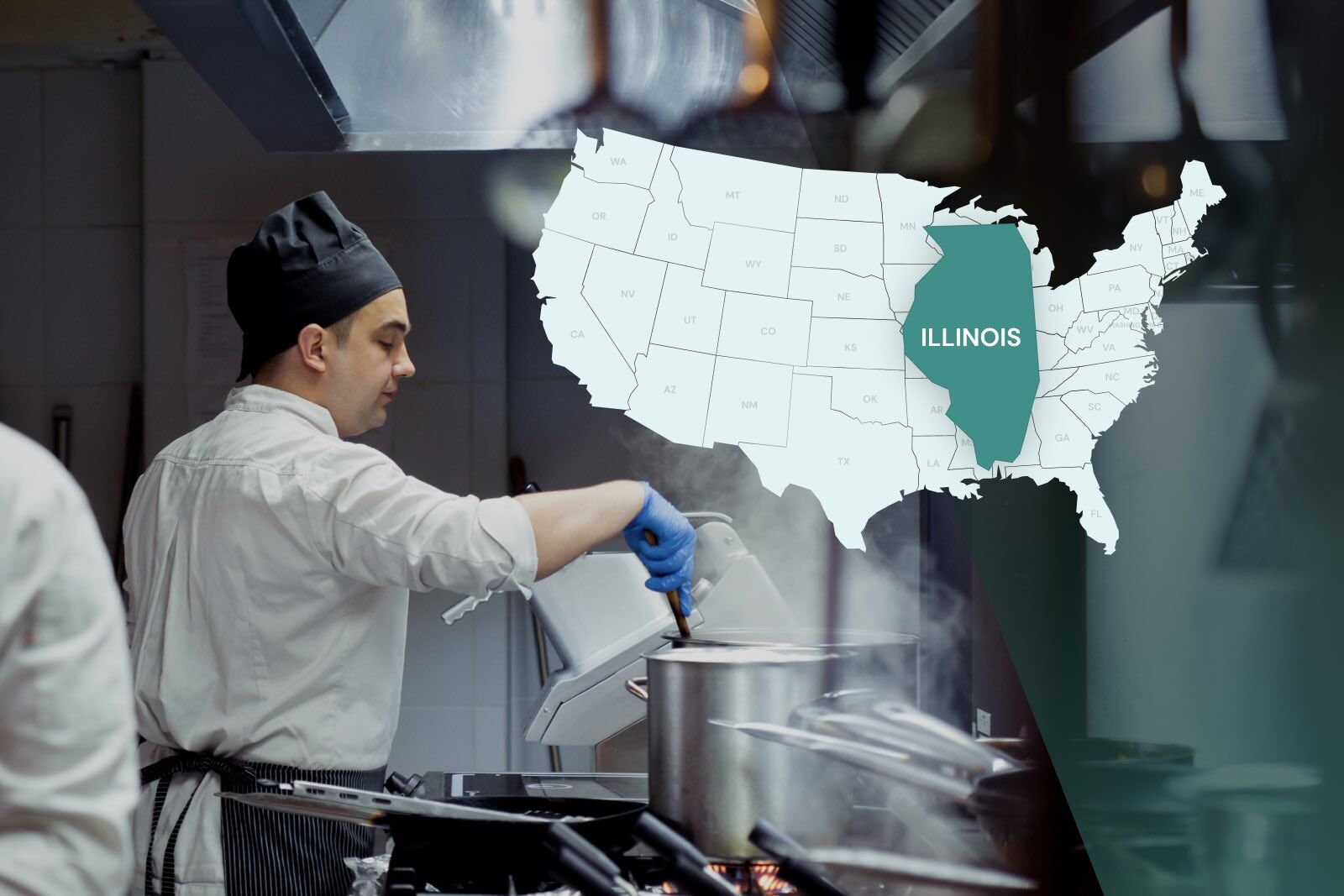The Food and Drug Administration (FDA) can make all the food safety recommendations it wants, but ultimately, each state, county, and city can implement its own rules.
Illinois is a key example. While the statewide regulations are based on the 2017 FDA Food Code, the City of Chicago has adopted additional requirements for the foodservice industry.1
Curious about the Prairie State’s regulations? Read on to learn about the food safety training and certification you need if you work in the Illinois foodservice industry.
In this article, we’ll answer the following questions:
Does Illinois require Food Handler Training?
Does Illinois require Food Allergy Training?
Does Illinois require Food Manager Certification?
What does the City of Chicago require?
Does Illinois require food handler training?
In a nutshell, yes. The Illinois Food Handling Regulation Enforcement Act requires all food handlers to complete an ANSI National Accreditation Board (ANAB)-accredited training within 30 days of employment.
The law defines a food handler as someone working with unpackaged food, equipment, utensils, or food-contact surfaces.2
There is one caveat! If you work in Chicago and hold a Food Service Sanitation Certificate, you do not need to obtain a food handler certificate as well.
Whether you take your training online or in person, your certificate is valid for three years. So, even if you change jobs, your certificate will remain valid in your next role.
Be ready to provide your manager with a copy of your certificate so it is available to the health inspector upon request.
Does Illinois require food allergy training?
Yes! In Illinois, all certified managers employed by a restaurant must receive or obtain ANAB-accredited allergen awareness training within 30 days of employment and every three years after that.2
In this case, a “restaurant” means any food establishment “primarily engaged in the sale of ready-to-eat food for immediate consumption.”2
The state also has legislation, such as the Childhood Anaphylactic Policy and Elijah’s Law, requiring school and childcare facilities to develop allergen protocols and ensure personnel have allergen training.3,4
Like food handler certificates, food allergy certificates are valid for three years. Provide a copy of your credentials to your manager so they are on file when the health department calls.
Does Illinois require food manager certification?
Yes! In fact, Illinois has more strict requirements than most states.
According to Section 410 ILCS 625 of the Food Handling Regulation Enforcement Act, food establishments must be supervised by a certified food protection manager during all hours of operation.2
In most states, managers must simply pass a certification exam to earn their credentials. However, Illinois requires managers to complete eight hours of approved training and then take and pass a Certified Food Protection Manager (CFPM) exam. Approved training programs and certification exams must be accredited by ANAB and the Conference for Food Protection (CFP).
A Food Protection Manager Certification is valid for five years, and you should ensure your establishment has a copy of your course completion certificate and CFPM credentials on file.
What does the City of Chicago require?
If you think the state takes food safety seriously, just wait. The Chicago Department of Public Health (CDPH) has its own food code, which holds every restaurant, grocery store, and food truck to a high food safety standard.5
The statewide requirements for food handler training, allergen awareness training, and manager certification still apply in Chicago. Once managers have earned their Food Protection Manager Certification, they must take it further and obtain a Foodservice Sanitation Manager Certificate.
To obtain a Foodservice Sanitation Manager Certificate, managers must apply for reciprocity with the city by submitting the following:
-
A copy of their ANAB-CFP-accredited Food Protection Manager Certification,
-
An “Hours of Training” verification form,
-
A copy of a valid photo ID (driver’s license, state ID, passport, etc.),
-
A $52.00 fee, and
-
A completed application, provided by Kennedy King College.6
Comparing the Illinois requirements
Below is a side-by-side comparison of the key differences between Illinois's training and certification requirements. You should know that every credential must be ANAB-accredited to be considered valid by the health department.
|
Food Handler |
Food Allergy |
Food Manager Training and CFPM Certification |
Food Service Sanitation Certificate |
|
|
Who needs it? |
Anyone who handles food |
Operator, GM, Manager |
Operator, GM, Manager |
Operator, GM, Manager |
|
Is it required? |
Yes |
Yes |
Yes |
Yes, in the City of Chicago |
|
How much does it cost? |
$15 |
$25 |
$90 |
$52 (reciprocity application fee) |
|
When do I need these credentials? |
30 days |
30 days |
Prior to employment |
Prior to employment |
|
How long is my credential valid? |
Three years |
Three years |
Five years |
Five years |
Bringing it together: the big picture
Navigating food safety regulations in Illinois, especially in Chicago, requires understanding state and local requirements. The state and city both seek to ensure high safety standards by requiring foodservice professionals to obtain food handler, allergen, and manager training and certification.
If you work in the Illinois foodservice industry, choosing an ANAB-accredited provider (like Trust20!) to help you meet these requirements is not just a legal requirement but a commitment to providing safe and enjoyable dining experiences for all.
Sources:
- FDA: The FDA 2017 Food Code
- Illinois Department of Health: Food Handling Regulation Enforcement Act
- Illinois General Assembly: Public Act 102-0413
- Asthma and Allergy Foundation of America: Food Allergies in Child Care
- Chicago Department of Health: Food Safety
- Kennedy-King College: Food Sanitation Certificate





.png)

.png)
